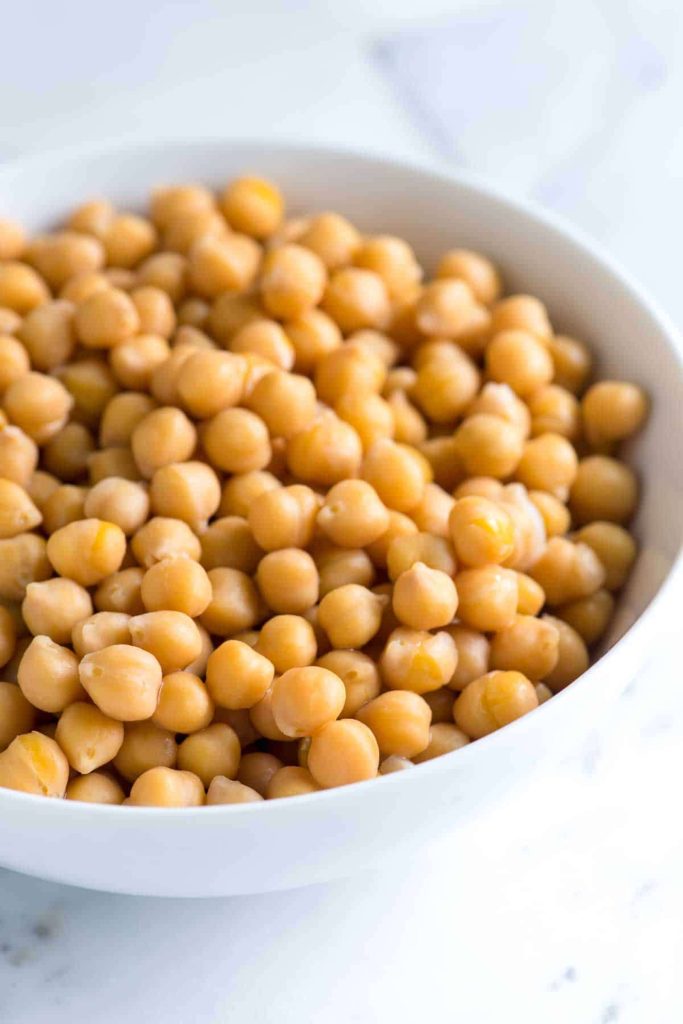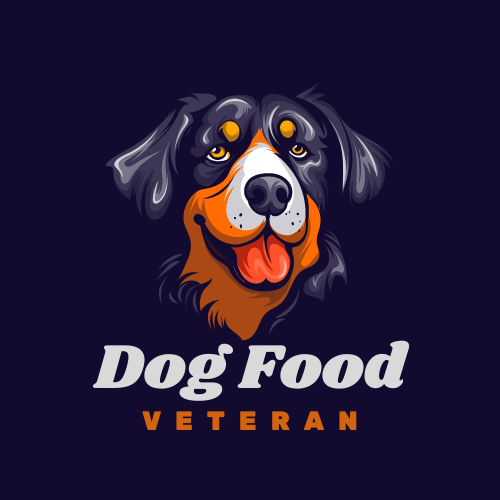I wouldn’t want to deny your dogs this delicious treat, so yes, you can feed chickpeas to your dogs. However, it should be in moderation.

What are Chickpeas?
Chickpeas, which are also known as garbanzo beans, are a type of legume from the plant species – Cicer arietinum. When you cook chickpeas, they have a buttery and nutty flavor as well as a firm texture.
Chickpea is a staple ingredient in several Middle Eastern, Mediterranean, and Indian cuisines and is also an excellent source of protein, fiber, folate, iron, and phosphorus. Plus, there are several ways to eat it – whole or mashed into a paste (hummus).
Are chickpeas good for dogs?
Well, it depends. As long as you serve it to your pets in moderation, chickpeas make a healthy treat and a good addition to their balanced diet. This meal provides the following nutrients for your dogs:
- Protein: Chickpeas are a good source of plant-based protein for your dogs, which can help them maintain lean muscle mass.
- Fiber: Chickpea is rich in fiber and can aid in promoting easy digestion and healthy bowel movements for your dogs.
- Folate: Chickpeas contain folate, a B vitamin that’s important for the cell growth and development of your dogs.
- Iron: The iron in chickpeas helps in transporting oxygen through the bloodstream, which is important for your dogs’ energy levels.
- Low fat: Chickpeas are low in fat, which makes them a healthy snack for your dogs, especially if you’re watching their weight.
Are chickpeas bad for dogs?
Now, chickpeas are not in any way toxic to your pets, but that doesn’t mean feeding them to your dogs doesn’t come with risks or downsides. Let’s take a look at some of them:
- Choking: If you have a pup or a small dog and you feed them whole or partially mashed chickpeas, it can choke them. So, I advise mashing the chickpeas properly before feeding them to your dogs.
- Gas and Digestive Issues: When you overfeed your dogs with chickpeas, their systems will have excess amounts of fiber and oligosaccharides, causing issues such as flatulence, bloating, and stomach discomfort.
- Allergic Reactions: If your dog is allergic or intolerant of legumes including chickpeas, it will trigger itching, diarrhea, and vomiting when they feed on them.
Why legumes shouldn’t be a regular part of your dog’s diet
Chickpeas make a good, occasional treat for your pets. However, there are some reasons you shouldn’t make it a regular addition to their meals:
- Plant Proteins Are Hard to Digest: Unlike animal-sourced proteins, it’s hard for dogs to digest and use plant-based proteins.
- Nutritional Imbalances: Making chickpeas a regular part of your dog’s meals will cause nutritional deficiencies because they will have excess plant matter in their systems.
- Weight Gain: Chickpeas, like other legumes, is rich in carbohydrates and when your dogs overfeed on them, it will make them gain weight, especially if they’re inactive for most parts of the day.
How to prepare chickpeas for dogs
Here are some helpful tips:
- Cook them thoroughly: Raw chickpeas are very hard and can choke your dogs or block their intestines if they feed on them. So, I advise cooking them till they’re very tender before serving them to your pets.
- Mash or turn them to puree: To reduce the tendency of your dogs to choke on chickpeas, mash them into a paste or puree before feeding it to them.
- Introduce them slowly like any new food: Always introduce chickpeas gradually to your dog’s diet in small portions to prevent them from having digestive upsets.
Some other tips:
- Avoid adding salt, spices, or other seasonings when cooking the chickpeas for your dogs
- Cook them plain without oils or sauces
- Consult your vet first if your dog has food allergies.
How to feed chickpeas to your dogs in moderation
It’s very important that you know how much chickpeas your dogs can consume. Although there’s no definitive formula, I recommend:
- No more than 1-2 tablespoons of cooked, mashed chickpeas per day for small dogs (under 20 lbs)
- No more than 1/4 cup of cooked, mashed chickpeas per day for medium dogs (20-50 lbs)
- No more than 1/2 cup of cooked, mashed chickpeas per day for large dogs (over 50 lbs)
Are there other ways for your dogs to get fiber and protein?
If you’re looking for alternative sources of fiber and protein for your dog besides chickpeas, here are some options to consider:
Alternatives to chickpeas (for fiber)
- Pumpkin puree
- Green beans
- Sweet potatoes
- Apples (without seeds)
- Carrots
Alternatives to chickpeas (for protein)
- Lean meats like chicken, turkey, beef
- Fish like salmon, tuna, cod
- Eggs
- Low-fat dairy like plain Greek yogurt
- Protein supplements formulated for dogs
FAQs
Can my dogs eat garbanzo beans?
Yes, your dogs can eat properly cooked garbanzo beans, but it should be in moderation.
Can my dogs eat garbanzo bean shells?
No, I don’t recommend that for your dogs because the shells are tough and they can either choke your dogs or block their intestines.
Can my dogs eat canned chickpeas?
Yes, but I advise that you look for low-sodium varieties with no added spices or sauces and rinse them thoroughly before feeding them to your dogs.
Can my dogs eat raw chickpeas?
Please don’t. You shouldn’t feed your pets raw chickpeas under any circumstance because they’re very hard to digest and can choke your dogs.
Can my dogs eat boiled chickpeas?
It depends. If you boil the chickpeas plain and cook it till they are very tender, then yes, you can serve it to your dogs.
Can my dogs eat cooked chickpeas?
Of course, you can as long as the cooked chickpeas are unseasoned and mashed or pureed.
Can my dogs eat roasted chickpeas?
Just like raw chickpeas, I strongly advise against feeding your pets roasted chickpeas because your dogs will have difficulty digesting them.
Conclusion
In summary, chickpeas (garbanzo beans) are a healthy treat for your dogs if you cook them properly and feed them to your pets in moderation. They provide some nutrients for your dogs, but they also come with downsides like bloating, choking, and potential allergic reactions for certain breeds.
To recap, ensure you cook chickpeas till they’re very soft and then mash or puree it before feeding them to your dogs to prevent them from choking on it. Also, do not season the chickpeas and feed them in the portions appropriate for their size and sensitivity. And these chickpeas should only be a supplement for a diet that’s largely high-quality animal proteins and healthy fats.
Lastly, introduce chickpeas gradually to your dog’s diet and monitor their reactions. If you have any concerns about adding chickpeas to your dog’s diet, consult your vet for their professional guidance.
Read More: Can Dogs Eat Eggplant?

